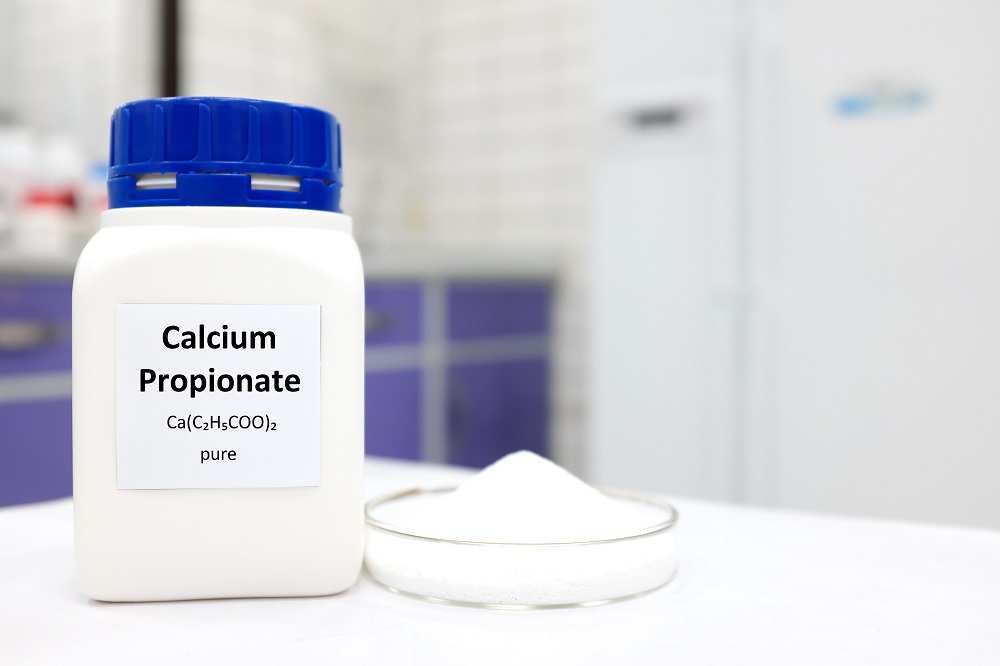The food industry relies on various preservatives to help prolong shelf-life and prevent food products from contamination against microorganisms that can cause spoilage (microorganisms can potentially pose a health hazard). One such preservative used is calcium propionate, the calcium salt of propanoic acid.
Calcium propionate is a vegan food additive since it does not contain any animal product or derivative. The preservative is industrially produced synthetically using chemical substrates, mainly propanoic acid and a calcium salt such as calcium hydroxide or calcium oxide. Calcium propionate is certifiably safe for human consumption and is an effective inhibitor of a wide range of bacteria and fungi.

Calcium propionate (C6H10O4Ca), the calcium salt of propanoic acid, is a commercially used preservative. The compound can also be called calcium propionate and can also be listed in ingredients lists by its E number, E282 (1).
The compound presents as a white crystalline powder with a natural pH that leans towards the alkaline (6-10.5). This means that calcium propionate is an effective preservative for food products that are more alkaline in nature.
Specifically, calcium propionate acts by inhibiting the growth of microorganisms that would cause spoilage. Microorganisms this compound can inhibit include Bacillus mesentericus, Listeria monocytogenes, Salmonella, and various molds.
The compound does this through several modes of action. Firstly, calcium propionate accumulates inside the cell and competes with several amino acids necessary for microbial growth. The propionate is also converted to propionyl-CoA which inhibits several CoA-dependent enzymes such as pyruvate dehydrogenase, succinyl-CoA synthetase, and ATP citrate lyase.
While calcium propionate disrupts metabolic activity in microorganisms, the preservative is metabolized differently in humans. The propionate is converted to propionyl-CoA as well, but the propionyl-CoA is further processed to become a usable intermediate in the tricarboxylic acid cycle (TCA; also known as the citric acid cycle or the Krebs cycle).
Aside from the food industry, calcium propionate is also used as a microbial growth inhibitor in other industries as well such as cosmetics, pharmaceuticals, and animal feeds. The compound is specifically used in animal livestock to help prevent milk fever (a metabolic disorder in cattle caused by insufficient calcium) and provide additional calcium supplementation.
Since the production of calcium propionate does not involve the use of any animal product or derivative, calcium propionate is suitable for vegan diets and lifestyles.
Calcium propionate can naturally occur in certain food items such as cheeses. However, industrial production of calcium propionate is exclusively from chemical synthesis.
While calcium propionate is suitable for most of the vegan community, there might be some individuals that would feel uncomfortable with calcium propionate. Like most food additives, calcium propionate has undergone several studies using animal models to evaluate its safety for human consumption.
Standing for animal rights, ethical vegans believe that animal testing is an unethical practice that exploits animal lives. Nowadays, new techniques have been developed that are able to substitute the use of animal models altogether. These techniques involve the use of cell models and in silico studies (i.e., the use of computer models and algorithms).
Thus, while calcium propionate is dietarily vegan, some might not consider it to be ethically vegan.

Production of calcium propionate relies on the direct reaction of propionic acid and calcium oxide or calcium hydroxide. Empirically, a single mole of calcium oxide (CaO) or calcium hydroxide (Ca(OH)2) would react to 2 moles of propionic acid (C3H6O2). The reaction would then result in a mole of water and calcium propionate.
The reaction of the substrates typically occurs in an aqueous solution and in the presence of a flocculant for product harvesting. The resulting product is then filtered, spray dried, sieved, and packed.
As an effective preservative, calcium propionate is used in a wide variety of products such as processed meats (e.g., hotdogs, hams, luncheon meats, etc.), alcoholic drinks (e.g., beers, wines, ciders, malt beverages, etc.), beverages (e.g., soft drinks, fruit drinks, etc.), dairy products (e.g., cheeses, whey, yogurt, powdered milk, etc.), and baked goods (e.g., pastries, bread, muffins, etc.).
Calcium propionate is an especially ideal preservative for bread and baked goods with estimates that 80% of all calcium propionate used goes into this food sector. This is because while calcium propionate inhibits the growth of many bacteria and molds, it does not inhibit the growth of yeast and its fermentation.
Food additives such as calcium propionate have to undergo numerous forms of evaluations and assessments to be certified and approved for human consumption. Specifically, calcium propionate has been approved by numerous food safety authorities.
Passing the specifications of the Chemical Food Codex, the FDA (Food and Drug Administration) approves the use of calcium propionate for human consumption and considers the food additive as GRAS (generally recognized as safe) (2).
In addition to holding calcium propionate to good manufacturing practice, the FDA also limits how much the food additive can be used in baked goods, cheeses, confections and frostings, gelatins, puddings, and fillings, and jams and jellies.
Aside from the FDA, the EFSA (European Food Safety Authority) also finds no evidence supporting that calcium propionate induces any form of genotoxicity and carcinogenicity (3). Currently, the EFSA has not established an acceptable daily intake (ADI) value for calcium propionate and the food additive is maximally permitted to be used in levels ranging from 1000 to 3000 milligrams per kilograms in food.
References
1. https://pubchem.ncbi.nlm.nih.gov/
